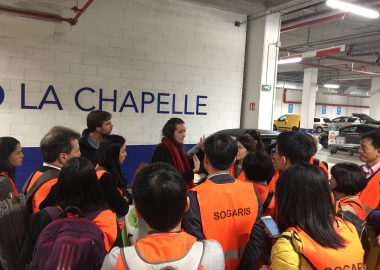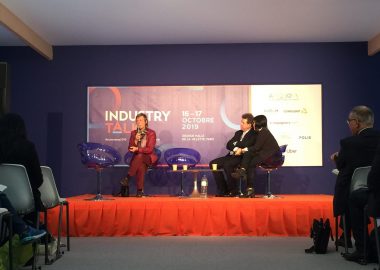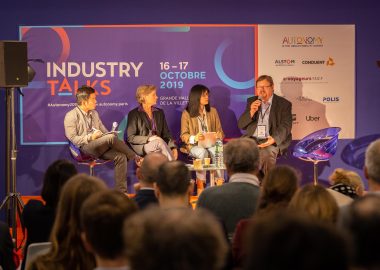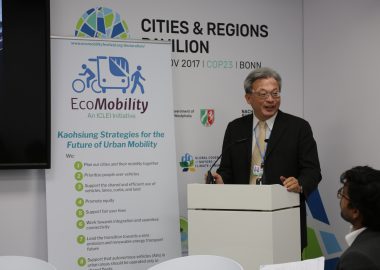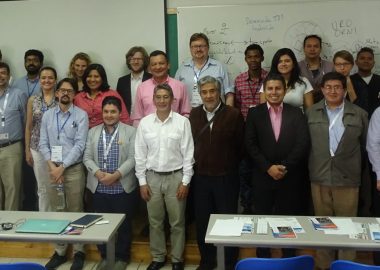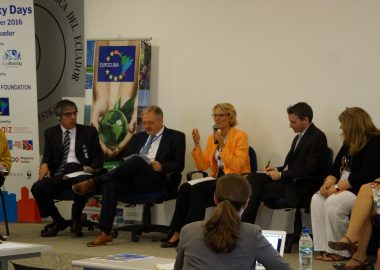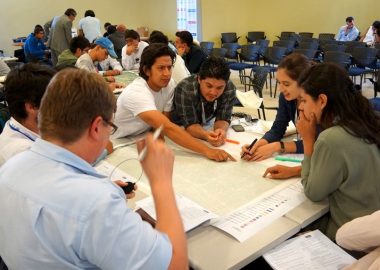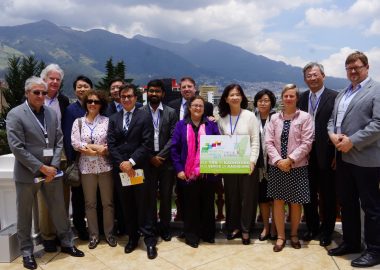EcoMobility Days 2017
Program
Friday November 10th 2017, 15:00 to 16:30
The transportation of both people and goods in urban environments is an essential aspect of cities but also a large and growing contributor to GHG emissions. The transport sector contributes 23% of global energy-related greenhouse gas emissions and 18% of all man-made emissions. The session will highlight EcoMobility and EcoLogistics as priority areas for local and national governments by raising awareness, collecting and developing policies, action plans, recommendations and guide pioneering cities to exemplary action.
Road transport (incl. freight) is responsible for around 74% of all transport emissions. The mitigation potential that low carbon urban freight policies and practices for freight transport (EcoLogistics) can contribute to climate change is high. But often, local capacities to act are low. Options exist, from strengthening pedal driven vehicles for inner-city distribution to switching fuels, planning new distribution centres and limiting the enormous growth rate for freight. Promoting cleaner and efficient vehicles for freight delivery is one viable alternative to low-quality diesel-powered freight vehicles.
Welcome by moderator
- Monika Zimmermann, Deputy Secretary General, ICLEI
Introduction
- Transport emissions overview – Mark Major , Senior Advisor, Partnership for Sustainable Low Carbon Transport (SLoCaT) (10 min
Mitigating transport emissions through low carbon mobility and freight
- Low carbon mobility in Melbourne – Amanda Stone, Mayor, City of Yarra, Australia (10 min)
- EcoMobility strategies in Kaohsiung – Ching-Fu Chen. Director-General, Transportation Bureau. Kaohsiung City Government (10 min)
- Low carbon mobility in Leipzig – Torben Heinemann , Head of Transport Department, Leipzig, Germany (10 min)
- Low carbon mobility in Buenos Aires –Juan Bautista Filgueira Risso, President EPA, Buenos Aires, Argentina (TBC)
- Santa Monica –Pam O’ Connor Council Member City of Santa Monica, CA (TBC)
Discussion
- Monika Zimmermann, Deputy Secretary General, ICLEI (10 min)
EcoLogistics : Low carbon freight for sustainable cities (project launch)
- Supporting low carbon transportation through the International Climate Initiative – Petra Bollich, Federal Ministry for the Environment, Nature Conservation, Building and Nuclear Safety (BMUB) (5 min)
- Low carbon urban freight –Sophie Punte, Smart Freight Centre, Netherlands (10 min)
- EcoLogistics in Indian and Latin-American model cities – Itzel Obregon, EcoMobility Officer, ICLEI (10 min)
Session conclusion
- Monika Zimmermann, Deputy Secretary General, ICLEI
Clean mobility reception
Wednesday November 15th 2017, 13:30 to 15:00
Our cities are experiencing unprecedented changes in transportation that are driven by social, economic and technical trends. As city leaders, it is our responsibility to guide these changes to ensure that accessible, connected, affordable, safe, and environmentally friendly mobility options are being integrated into our existing and future communities. The Kaohsiung Strategies on the future of urban mobility adopted in October 2017 shall inspire local governments to transforming their transportation systems and mobility patterns towards reduced automobile dependency and towards becoming more sustainable, low-carbon and people-centered.
The Kaohsiung Strategies strengthen ecomobile solutions; walking, cycling, public transport, shared mobility and their interconnectivity as backbone of urban mobility in the future. The Kaohsiung Strategies equally call for a dedicated debate on emerging trends and new technologies, subsidies and bans including their opportunities, challenges and treats. They also present ICLEI’s translation of the 2030 Sustainable Development Goals and the New Urban Agenda into local mobility policies and shall bring a strong message on urban mobility and climate to the UN Climate Conference COP 23.
Welcome by moderator
- Santhosh Kodukula, Project Coordinator, Wuppertal Institute of Climate, Environment and Energy, Germany
- Ching-Fu Chen. Director-General, Transportation Bureau. Kaohsiung City Government
Strategies to drive our future cities
- Transforming urban mobility – a global perspective – Holger Dalkmann, Co-Chair of SloCat, Germany (10 min)
- Urban mobility of the future in British Columbia – George Heyman, Minister of Environment & Climate Change, Government of British Columbia, Canada (10 min)
- Urban mobility of the future in Marseille – Jean-Charles Lardic, General Civil Engineer, Deputy Head Management of Services and Chief Executive Officer of Forward Planning, Marseille, France (10 min)
- Urban mobility of the future in Turku – Risto Veivo, Development Manager, Central Administration of the City of Turku, Finland (10 min)
- The Impact of the Kaohsiung Strategies – from Active Mobility to Fusion Mobility – Manfred Neun, President of ECF (European Cyclists’ Federation) and WCA (World Cycling Alliance) (10 min)
- 3 Revolutions (3R) scenario – Ramón J. Cruz, International Policy Program Director, Institute for Transportation & Development Policy (10 min)
Discussion and conclusion
- Santhosh Kodukula, Project Coordinator, Wuppertal Institute of Climate, Environment and Energy, Germany (15 min)
News


